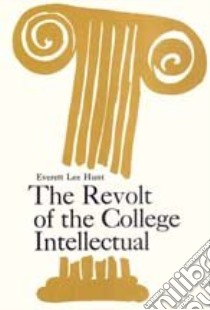The Revolt of the College Intellectual - 9780202309828
Un libro in lingua di Hunt Everett Lee edito da Transaction Pub, 2007
- € 22.80
- Il prezzo è variabile in funzione del cambio della valuta d’origine
The exuberant explosions of old college days have traditionally been forgiven as somewhat enviable expressions of the high spirits of exultant youth. Are young intellectuals, now the dominant group in many colleges, less adolescent and more mature, or do their immaturities merely manifest themselves in different ways? As intellectual individualists, students do not usually care for group explosions unless they are for social causes such as the rights of minorities. But their adolescence often manifests itself individually in a superior condescension or in depressive inferiority complexes.
This book is a fascinating account of the changes that have taken place in the backgrounds, attitudes, and, temperaments of students at the so-called prestige colleges. Though Everett Lee Hunt draws heavily upon his observations and experiences during more than thirty years as a dean and professor of Swarthmore College, his book is much more than a case study of one outstanding college. Hunt presents many concrete examples of student moods, customs, actions, and expressions of values. With wisdom and warmth he discusses three successive eras in the college schooling of American adolescents: guarded education, conformity to accepted ways, and intellectual individualism.
Teachers, deans, student counselors, personnel workers, and school psychologists and psychiatrists will find this classic book of continuing interest in guiding their dealings with adolescent students. The Revolt of the College Intellectual may also interest students themselves, their parents, alumni, and all who are in anyway concerned with education as a preparation for life in a rapidly changing and troubled world.
Everett Lee Hunt, who died in 1984, taught at Huron, Swarthmore College, Cornell University, and the Universities of Illinois and Colorado. His writings include studies of Plato, Aristotle, and Matthew Arnold. He was the eighth president of the Eastern Communication Association Committee of Scholars and one of the founders of the field of communication.
Informazioni bibliografiche
- Titolo del Libro in lingua: The Revolt of the College Intellectual
- Lingua: English
- Autore: Hunt Everett Lee
- Editore: Transaction Pub
- Collana: Transaction Pub (Paperback)
- Data di Pubblicazione: 31 Gennaio '07
- Genere: EDUCATION
- Argomenti : College students Social conditions United States College students United States Intellectual life College environment United States
- Pagine: 172
- Dimensioni mm: 228 x 152 x 12
- ISBN-10: 0202309827
- EAN-13: 9780202309828


